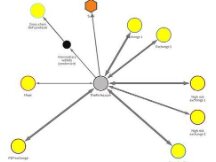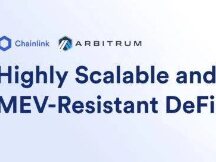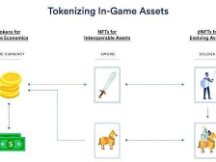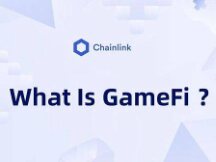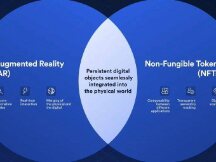Improve the scalability of the DeFi ecosystem and eliminate SRM with Arbitrum and legitimate services.

In just a few short years, the smart card industry has evolved into a large decentralized application ecosystem with the emergence of decentralized finance (DeFi), non-homogeneous tokens (NFT), and downloadable games. and other specialized and innovative industries. However, for a smart contract company to continue to attract millions of new users and become a major contract supplier, it must maintain a high level of efficiency by improving its capitalization and minimizing the negative impact of the market. miners' extractable value (MEV). to believe. This article describes Chainlink's recommendations for measuring Ethereum smart contracts and the joint solutions developed by Arbitrum and Chainlink to eliminate MEVs from Arbitrum and create more smart contracts. .
There are many different types of solutions, and L2 solutions use a process called “rollup”. Rollup has slowly grown into a major expansion for Ethereum. This is mainly because the competition can measure the volume of the market currently governed by smart contracts, has been consistent with other business applications developed by the contract Strength and security on the Ethereum network.
However, the rollup still does not solve all the MEV issues contained in L1, so the reliability of the blockchain is still at risk. The SRM problem arises because transaction miners / sequencers have the power to determine the order of transactions in their own block and therefore can cause harm to others by governing the order of trade, industry, flight and sandwich industry. Yes. MEV makes it impossible to identify changes in rigorous processes, significantly affecting the reliability of smart contracts and affecting the widespread use of the blockchain industry.
To solve the SRM problem as much as possible, the Chainlink team is committed to developing a Social Justice Program (FSS). FSS is a business segmentation sorting service that helps identify changes in a timely manner, all users can participate equitably, and the benefits of analysis are realized. So, the smart contract industry can not only complete the investment with the best L2 class solutions like Arbitrum, but also use the FSS of L2 to solve the trust issues of MEV.
Next, I will briefly describe the roll-up systems and their main advantages, as well as the best concepts for solution and arbitrage. Arbitrum is Chainlink's benchmark for measuring Ethereum smart contracts. We will see later how Arbitrum integrates FSS to reduce VPD and restore fair trade.
What is cumulation? What is the key to solving the problem?
Typically, swapping is the interchange of computations needed to allow consumers to swap from L1 to an off-chain L2 network for lower costs. Rollup can take advantage of the security of L1 by sending exchange data and connection short data of the L1 connection for confirmation or resolution.
Notably, it compresses hundreds of user-independent exchanges into exchanges, then publishes them on L1. The node responsible for the rollup creates a new root state which is an encrypted hash value of the current state of the network, and this root hash is also assigned to the L1 network to prove what the node has done. This proof is considered as proof of validity (note: create zero-knowledge certificates) or proof of fraud (note: proof is repeated). zkRollup uses credentials when the need arises.
When positive expectations are proven, a "period of conflict" (note: usually one week) begins. Meanwhile, anyone who believes the root hash is incorrect can provide evidence of fraud. This plan is called "positive thinking" (caution: hope) because a significant change is essential if no one is discussing fraud right now. . However, when a person provides proof of fraud, all or part of the transaction is carried out on the L1 network to ensure that the services include the claim. If the result of the execution of the chain does not match the statement (for example, the root hash), the root hash and all subsequent statements are removed and the recipient leaving the warranty loses their deposits. If the request is confirmed as true, the person who initiated the contest will be rejected.
Since all exchange data in positive order is stored directly in L1, each transaction can create an updated state of the chain and provide false credentials if necessary. In this process, only one of the righteous should see the state of complete trust in partnerships to keep consumers safe. Users can also choose to identify themselves without a third party to ensure the security of their funds. Users can also force removal of L1 at any time. This means that the user's account is not L2 locked and cannot be refunded.
By moving most of the counting operations off the chain and storing only a small part of the data in L1, L2 rollup can not only improve security, but also reduce costs. For this reason, Rollup has become the best solution for blockchains like Ethereum. Then, the cost of using the application will be reduced and it will be able to operate in real time, which will facilitate the realization of large applications on the blockchain.
Arbitrum Optimistic Cumulation Protocol
Arbitrum is the best L2 stacking program in terms of overall performance, community size, and sustainability. Arbitrum is one of the pioneers in rollup technology, so it is sought after by most of the cryptocurrency community, and its team has attracted many industry leaders as well. Offchain Labs is the Arbitrum development team, led by former White House CTO Ed Felten, Ph.D. of Princeton University. There are many top computer scientists in the field of cryptography and blockchain technology, including Steven Goldfeder and Harry Kalodner.
The development team referred to Arbitrum can perform a similar EVM. This means that Arbitrum can achieve an unmodified Solidity smart contract and a complete Ethereum-like industry using existing tools and technology output. Arbitrum adopts the most promising technology that takes smart contract compute and state storage off the chain, making it potentially large and at the same time reducing exchange rates as much as possible. .
The Arbitrum rollup uses the new combination of proof of concept to prove L1 fraud in a cost effective and affordable way. Arbitrum's interactive anti-fraud mechanism includes interactive procedures based on L1 smart contracts. The contract resolves the conflict with step-by-step instructions in calculating and activating Ethereum. To do this, it is not necessary to repeat all the changes on L1 at a high cost. The Arbitrum Mechanism has some very strong features, such as a cap at a lower oil price than Ethereum and no cap the size of a smart contract.
It should be noted that when using these extensions, Ethereum improves the security of Arbitrum, so that everyone can participate to ensure that L2 results are accurate and reduce reliability. As the smart contract ecosystem not only enables capacity, but also guarantees the same level of security as L1, more and more applications will be seen. For more information, see Arbitrum's in-depth protocol. In addition to Chainlink Price Publishing, several large DeFi projects have been developed on the Arbitrum One network. Arbitrum One's distributed application ecosystem is constantly expanding and you can view the ecosystem's applications through the Arbitrum portal.
Withdrawal of the SRM from fair service
Continuing the partnership between Offchain Labs and Chainlink Labs, the two sides jointly explored the Social Security Service (FSS) application to eliminate as many VPDs as possible. FSS is a collaborative system that solves the SRM problem. The FSS uses a decentralized network oracle, where Chainlink nodes in the network collect traffic from users in the chain, establish an agreement to divide the company, and use the Arbitrum protocol to distribute the traffic for export. We are excited to partner with Offchain Labs to explore how to use FSS to achieve distributed product allocation for Arbitrum and MEV reduction.
Ari Juels, director of research at Chainlink Labs, said in a recent SmartCon 2021 presentation that the FSS plan will be rolled out in two phases. The first step is “safe causal sequencing” (warning: atomic scattering). The user interface is first encrypted by the user, encrypted data exchange, then identified by the Oracle distribution network, then decrypted and processed via the Arbitrum protocol. Nodes cannot preempt transactions because they cannot see the payment before analysis.
The second phase is the objective of our partnership with Arbitrum. FSS uses Aequitas' sorting (approval) protocol (note: co-authors include Ari Juels from Chainlink Labs and Steven Goldfeder from Arbitrum) to identify timely changes received by the majority of nodes. Thus, a “first in, first out” sorting mechanism has been developed. These processes are integrated with the first-level crypto exchange mechanism to apply an in-depth block approach to the integrity of consumer products. The White Chainlink 2.0 document covers FSS technology in Chapter 5.
Finally, the built-in FSS and Arbitrum protocols can ensure that users are not involved in the process. As the number of requests sent to Arbitrum One and all locks on the network continues, fair distribution services will become more and more important. FSS will also improve the reliability of the Arbitrum protocol by establishing a sharing process to eliminate the risk of offline nodes as much as possible. The combination of Arbitrum's best L2 stacking capabilities and FSS exchange integrity makes Arbitrum the best Ethereum scaling solution to cover millions of users worldwide and various types of applications from classification.

Arbitration protocol integrated into FSS
Steven Goldfeder, Co-Founder of Offchain Labs, said: “Our mission has always been to establish a separate segmentation of the Arbitrum protocol to maximize user trust and reduce weak SRMs. We are looking forward to partnering with Labs.Building for a long time. -Part time to partner and collaborate to explore ways to implement FSS in Arbitrum. Chainlink Labs team has extensive experience, with profitable research and safe and reliable contract performance.
Sergey Nazarov, Co-Founder of Chainlink, said: “We are delighted to see the announcement of Arbitrum One, which provides critical planning opportunities for the Ethereum ecosystem. Together, Ethereum Chainlink Labs has always been. Since we are proud of their strength and character, the two parties have entered into a long-term partnership to explore how to integrate FSS into Arbitrum, the new business model for fair trade that enables manufacturers to achieve scalability and for contracts. intelligent. Help eliminate MEV. "

Scan QR code with WeChat
